Being a leader often puts you in the driver’s seat, guiding conversations and decisions. But true leadership might just lie in the art of stepping back to listen, particularly when you’re naturally inclined to lead the conversation.
Share the Vision, Then Step Aside
Once leaders set a clear vision, it’s important to let the team brainstorm on how to achieve it. By focusing more on listening, leaders can uncover the true depth and diversity of ideas in their team, especially from those who may not always speak up first.
Understanding Different Voices with Myers-Briggs
The Myers-Briggs Type Indicator highlights how different we all are. For instance, while extroverts may quickly voice their thoughts, introverts might need a bit more time or the right environment to share theirs. Recognizing and accommodating these differences is essential for leaders who wish to harness the full potential of their teams.
Being Present and Letting Go
Eckhart Tolle emphasizes the value of being in the present. For leaders, this translates to truly hearing when someone speaks. Instead of mentally running through the next item on the agenda, or focusing on getting everyone to the same place you are, it’s about focusing intently on the words being shared right now.
Agenda vs. Outcome: The Balance
While it’s essential to have a structure and a goal, being overly attached to ticking off agenda items or rushing towards an outcome can stifle creativity and valuable input. Letting go of rigid outcomes and focusing more on the process and building relationships often leads to a more engaged and high-functioning team.
The Long-Term Benefits of Listening
Yes, taking the time to listen and discuss might take more time at first. But the payoff can be game changing:
-
Richer Ideas: Different voices bring varied perspectives, leading to well-rounded decisions.
-
Team Cohesion: When members feel heard and valued, they’re more invested in the team’s success.
-
Continuous Growth: Leaders who listen are always learning and adapting.
-
Independent Team: A team that will be more proactive, independent, and creative.
In conclusion, embracing the practice of listening, understanding the diverse personality types, and focusing on the “how” v. the “what” can transform leadership your leadership and help you build a cohesive, effective team that thrives on collaboration and shared success.
